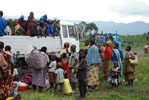
To commemorate World Humanitarian Day yesterday, the U.S. State Department announced a pledge of $160 million to support international humanitarian assistance for some of the world’s most dire crisis zones. Speaking at a special briefing, Assistant Secretary of State for Population, Migration and Refugees Eric Schwartz noted that $58 million would be devoted specifically to assistance for humanitarian crises in Africa, namely to Somalia, Congo, Sudan, and Chad – conflicts that have displaced millions of people.
The announcement came a day after UNHCR unveiled the first phase of a plan to alleviate some of the strain on the world’s largest refugee camp – the Dadaab camp in eastern Kenya, which currently houses three times the number of residents that the facility was built to accommodate. The U.N. High Commissioner for Refugees plans to relocate 12,900 Somali refugees from Dadaab to Kakuma camp in northwest Kenya. The relocation effort began over the weekend with the arrival of 311 refugees to Kakuma and is expected to be completed by the end of October.
Asked by Enough about U.S. involvement in efforts to stabilize Dadaab, Assistant Secretary Schwartz said that his office would be “very engaged” on this “extremely important issue,” noting that he would personally travel to Africa in the next month or two. “Certainly the issue of Dadaab will be very high on my agenda,” Schwartz said.
Schwartz also emphasized the high-level engagement of Secretary Clinton and the U.N. High Commissioner for Refugees.
“Secretary of State discussed the Dadaab issue with her counterpart in Kenya, which was as clear a reflection of the importance of this issue to us as I can express to you. Following the Secretary of State’s visit, the U.N. High Commissioner visited Kenya to discuss the Dadaab issue, and I am very hopeful that the Kenyan authorities will work with the international community to create conditions that will make [Dadaab camp] much more livable…”
The pledge Schwartz announced marks an increase in funding for humanitarian assistance, up from the $4.5 billion the U.S. was already on track to contribute this year.
The special briefing marked the first World Humanitarian Day, which was established last year primarily in response to the death of 22 U.N. employees, including the then U.N. Special Representative for Iraq Sergio Vieria de Mello, in a suicide bombing attack at the Canal Hotel in Baghdad in 2003. As Assistant Secretary Schwartz noted, World Humanitarian Day was created to underscore the critical importance of humanitarian assistance to vulnerable populations around the world and to honor the people who work on humanitarian issues, especially those who have lost their lives in the line of duty.
“Ours, unfortunately, is a growth industry,” he said.
Photo: Congolese civilians arrive at a camp for displaced people near Goma in eastern Congo.

